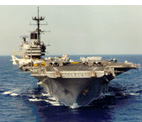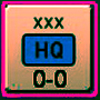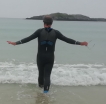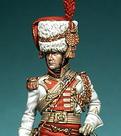warspite1
Posts: 41353
Joined: 2/2/2008
From: England
Status: offline

|
Draft incomplete
The fleets collide
That the two fleets would meet at some point on the 31st May seems pretty likely, but the reason they stumbled upon each other when they did was thanks to a little Danish steamer - the NJ Fjord. The Danish vessel had stopped in the water and was spotted at almost the same time (around 1415hrs) not only by the light cruisers Phaeton and Galatea - the most easterly placed ships of the Battlecruiser Fleet (BCF), but also the German light cruiser Elbing and her three torpedoboat (TB) escorts (B109,B110 and B111) - the most westerly placed ships of the II Aufklarungsgruppe (IIAG).
The two British cruisers went to investigate and the Germans sent the B109 and B110 on a similar mission - both the British and German sailors quickly got sight of much more than they were bargaining on. Upon sighting each other, the TBs and Galatea fired what were the first shots of the Battle of Jutland. Elbing soon provided support to her escorts and quickly found the range, hitting Galatea below the bridge (fortunately for the British the shell did not explode).
The TB's fell back on Elbing and, after the hit on Galatea, the two British cruisers headed northwest while radioing to Beatty on board HMS Lion "Urgent. Have sighted a large amount of smoke as though from a fleet bearing ENE. My position.........". This was received in Iron Duke at 14:35hrs.
To this communication was quickly added "Urgent. Smoke seems to be seven vessels besides destroyers and cruisers. They have turned north. My position........". Iron Duke records receiving this at 14:41hrs.
The Elbing was also busy signalling - although due to an error she actually reported sighting 24-26 battleships according to Jellicoe The Unfinished Battle...
So what was happening elsewhere while this localised cruiser/TB action was taking place?
At the time that the NJ Fjord was writing herself in the history books by being the catalyst for the meeting of the world's two largest battlefleets, Beatty was in a position to make his turn to the north for the rendezvous with Jellicoe (see post 62).
3. The Turn of the 5BS
We now come to our next talking point. Having made the turn to the north, the realisation that the enemy were close by caused Beatty to order his ships to turn SSE. But why did the 5BS wait 5-10 minutes before turning in line with the manoeuvre executed by Beatty? As a result of this, this key squadron was no longer 5 miles behind Beatty - it was 10 miles....
I will use the superb The Rules of the Game to put together a summary of what happened and the part played by the three key individuals; Beatty, Seymour and Evan-Thomas. Obviously no one at the time knew that "there was going to be something wrong with our bloody ships today", but as we now know, the fact that there was, made what happened next incredibly important and was to have a dramatic effect on the outcome of the battle.
So what happened? Remember timings are not necessarily 100% correct and many of the exact details can never be known for certain as records have been lost and/or tampered with and/or some versions of events have been incorrectly told either through genuine mistake or the need to cover mistakes.
- When Galatea first reported contact with the enemy at 1420hrs, Beatty had made the turn north to meet with Jellicoe.
- The 2nd and 3rd LCS "charged to the sound of the guns" in support of Galatea and the three other ships of the 1LCS.
- Beatty now had to decide what to do next
- He stated that he ordered an immediate turn to South South East (SSE) although in fact it took him 5 minutes to order the destroyers to re-deploy around their respective battlecruiser squadrons and then another 7 minutes for the battlecruisers to head on the new SSE course - presumably to cut-off whatever German forces had been found, from their home ports.
With apologies for my 3-year old's diagram......

- Five miles to the northwest, aboard Rear-Admiral Evan-Thomas's flagship Barham, the flags were seen but could not be read. Whether that was because of the wind direction or the increased smoke belching from the funnels as Beatty ordered an increase to 22 knots and preparation for full speed, is not known.
- However, aboard Barham it was taken that the signal was to order a resumption of the zig-zagging that had temporarily ceased when turning north. Accordingly the 5BS moved 2 points north by west.
- Prior to the turn north, HMS Tiger was the battlecruiser closest to Barham. It was her job to relay signals by means of searchlight (a back up in case of problems with the flag signals). However, with the turn Tiger was now the furthest battlecruiser from Barham and assumed that role was no longer hers. No one passed the searchlight message on.....at least not initially.
- The 5BS and the ships of the BCF, initially 5 miles apart, were now sailing away from each other at a rate of knots.
- It is believed that Tiger contacted Lion about the missing searchlight communication, while aboard Barham, Captain Craig and Flag-Commander Egerton tried to point out to the Rear-Admiral that perhaps they should be following Lion once it became apparent that the difference in course was nothing to do with a resumption of the zig-zagging.
So how long did it take for Barham and the 5BS to turn around?
Gordon states that it must have been some time because for Evan-Thomas to be questioned on his own bridge, Captain Craig must have been pretty concerned. Also, if it took Tiger's reminder to Lion about the searchlight, that process in itself would have taken sometime. Taking all the evidence into account, Gordon has calculated an average time of over 7 minutes which equates to a distance from Lion of 10 miles.
Who was at fault for this mis-communication? Beatty, Evan-Thomas or who?
Trying to understand what happened is important if only for the simple reason that the consequences of the breakdown in communication, unprofessional behaviour, being a stickler for procedure [delete to suit your own tastes and thought process] was that Hipper not only got away from the "Run to the south" lightly, but that his battlecruisers destroyed two of Beatty's ships in the process.
1. The case against Beatty
Well I will come out and say it - Beatty is my villain of the peace here. There is a serious unanswered question surrounding Rear-Admiral Evan-Thomas (see below), but all things considered, Beatty just has so much against him - a couple of things we have already touched on:
- The fact he did not feel the need to meet with Evan-Thomas when 5BS joined his fleet
- The shoddy, deployment of 5BS (essentially discounting the very idea that they would meet any Germans) when in cruising formation
- Beatty's first biographer claimed that if 5BS was closer to the BCF then Hipper would not have gone into battle and the British wanted to bring the Germans to battle. As Gordon points out, that would be worth considering if Beatty knew for a fact that he was going to meet Hipper and not Scheer's battlefleet.....
- And other arguments put forward to justify his decisions after the battle are - in some cases at least - pretty outrageous.
- It was Beatty who decided to continue with the unfortunate Seymour (see below). Beatty (totally wrongly) was all for getting rid of the perfectly able Commodore Goodenough after the Scarborough raid, but could not see that Seymour had been largely to blame in December 14, and then again a few months later at Dogger Bank.
- Why did Beatty not use the time - from the initial report by Galatea to the decision to move SSE - to concentrate his forces? He could have done that even after the turn SSE and allowed 5BS to catch-up if not achieved in the 12 minutes before. By taking this course of action the searchlight back-up failure would probably have been noticed sooner. Instead he went charging off into the distance.
- In response to the accusation that he was wrong not to have concentrated his forces Beatty said something to the effect that "why would six British battlecruisers not want to take on five similar German ships. Again this assumes that he knew that Galatea had stumbled across Hipper's reconnaissance forces; of course at that stage he knew no such thing and it could have been Scheer (although in his defence did he believe that Scheer was in the Jade as per the earlier faulty intelligence?).
- Given everything we know about Beatty post-war, could it also be that he simply didn't want the 5BS getting the glory in any trouncing of the German fleet? Such thoughts could explain why his deployment was so shoddy but he can't have it both ways - his deployment was either unprofessional in a time of war (remember this was set out pre the false intelligence on Scheer - and in any case there was no word on Hipper) or he allowed ideas of personal glory to get in the way of doing the right thing.
2. The case against Seymour
- For reasons mentioned above in exchange with Speedy, I don't like to dwell too much on this unfortunate young man. Thanks to Beatty's over-indulgence, at the time of Jutland, Seymour was in a position he had already proven unsuited for. However, despite the tragedy of this man's end, the fact is that for one man to have the accusation levelled at him that he cost the Royal Navy three battles, it is clear that his contribution cannot be glossed over (see post 31).
- All that was required was for the letters EJ (close the flagship) to be flashed to Barham and there would have been no confusion, no cause for delay. But that required someone to have the presence of mind to make such a signal.
3. The case against Evan-Thomas
- The accusation against the Welsh Rear-Admiral is that he was too much of a stickler for the rules and proper procedure. A signals man himself, he would, so the accusation goes, have waited for a properly executed signal to be hoisted, acknowledged, and then lowered (thus making the signal executive) before taking any action, and he would have done this (i.e. nothing) regardless of what other evidence was telling him at the time.
- My first reaction was that this was unfair, and to blame Evan-Thomas is essentially a convenient way to try and absolve Beatty of blame. Whilst there would not have been an issue if Beatty had not done a better commanding officer's job, the delay in 5BS turning does seem excessive and it is intriguing to know what actually took place on the bridge of HMS Barham between 1420hrs and when the order to turn was given.
- Both the Battlecruiser Fleet Standing Orders (BCFO), which Evan-Thomas may be forgiven for not knowing intimately, but also the Grand Fleet Battle Orders (GFBO), which he certainly would, contain wording to the effect that the fleet is to be guided generally by the movements of the commander's squadron.
- Gordon sets out the defensive arguments put by Evan-Thomas and his supporters after the war but I won't repeat them here. Suffice to say that they don't hold up to forensic scrutiny - and in that sense can be seen as similar to many of Beatty's arguments.
It's easy to sit here and criticise with the benefit of hindsight. What we can't know is what exactly was going through the minds (of Beatty and Evan-Thomas in particular) during those fateful minutes following the report from Galatea. We can't know what other distractions were perhaps occupying the mind - in addition to trying to understand incoming reports, interpret them, and then decide what to do as a result.
As we shall see the British were not the only ones to make mistakes (but the British made the most) - in time of war they are only to be expected - and some were more understandable than others. But the above was not an understandable series of errors. This was not 1914, the battlecruiser fleets had engaged previously - the need to expect the unexpected, be clear about who was doing what, the need for signalling procedure to be up to scratch were all lessons that should have been learned by May 1916. But many of the problems encountered earlier were simply being repeated anew.....
 Attachment (1) Attachment (1)
< Message edited by warspite1 -- 5/27/2016 6:41:22 AM >
_____________________________
England expects that every man will do his duty. Horatio Nelson October 1805  |
 Printable Version
Printable Version



























 New Messages
New Messages No New Messages
No New Messages Hot Topic w/ New Messages
Hot Topic w/ New Messages Hot Topic w/o New Messages
Hot Topic w/o New Messages Locked w/ New Messages
Locked w/ New Messages Locked w/o New Messages
Locked w/o New Messages Post New Thread
Post New Thread